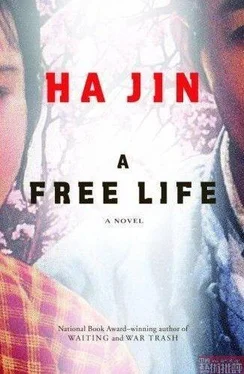"I see."
Ruhua promised to try her best to help the Mitchells. At the request of Janet, Pingping wrote a reference letter for her and Dave, stating that they were virtuous, dependable, and compassionate. Nan put it into English because Ruhua wanted the translation attached to the original. Even though she could speak Mandarin fluently, the agent couldn't read the written characters. The Mitchells needed two more letters, and Janet asked another friend of hers and Susie, the salesgirl working at her jewelry store, to provide the other references.
THE SURFACE of the lake was glittering in the morning sunshine. In spite of the wintry weather, a flock of mallards was paddling in the water, which had grown drab due to the absence of green foliage. Nan had once liked observing the Canada geese, but he couldn't tolerate them anymore. To him they were robbers and gluttons. Whenever they came into the yard, they'd graze on the grass, each guarding an area for itself. If one of them wandered into another's territory, the other goose or gander would lunge at the trespasser with flapping wings, a stretched neck, and an open beak emitting ugly hisses. The lakeside was already naked, the grass eaten up by the waterfowl. Since the fall, the Wus' back lawn had been dwindling. The geese would browse closer and closer to the house. Sometimes they would even come below the deck, pulling and jabbing at the grass without pause. Pingping would chase them away whenever she saw them coming too close, but they'd soon return and resume grazing on the sward, always tearing the tender shoots first.
At the beginning of the previous spring, Pingping had planted some garlic and scallions in the semicircles formed by the monkey grass, but a few days after the sprouts pierced the loam, the geese had pulled them up and eaten them all. The backyard could have been cultivated into a vegetable garden, but the piggish waterfowl would have devoured all the seedlings.
To Nan 's amazement, when the sweltering summer set in, the geese didn't leave for the North as they were supposed to do. Instead, they perched in the shady bushes on the other shore and came out only in the evenings and early mornings. The families living on the lake fed them, mostly bread and popcorn, so there was always plenty of food for them. Nan realized that these Canada geese had grown fat, lazy, and comfortable, no longer possessed of the instinct for migration.
That thought irked him, and a trace of disdain crept over his face. Just for easy food, the geese had chosen to live a riskless, stranded life. Nan noticed that seldom would they fly off to another body of water nearby. To the north, just ten miles away, there spread Lake Lanier, which abounded in fish and algae. It was reported that a catfish named Little Bobbie, weighing at least eight hundred pounds, lived in there, and every fall the radio would urge people to go catch him so that the captor could win a million dollars at the catfish derby. What's more, that lake's water was clean and vast, but these Canada geese wouldn't go there and confined themselves to this pond as long as food was offered to them. They had grown heavy and clumsy, yet their appetite remained gluttonous, as if they were no longer wild birds that were supposed to spend a part of their lives in the air.
"What losers! These geese live like millionaires," Nan would say to his wife whenever he saw them paddling in the water.
Pingping would smile, saying he was just an angry man. Why couldn't he let the birds have an easy life? What was wrong with their inhabiting this lake?
"Nobody should feed them from now on," Nan continued. "Totally spoiled, they've lost their animal instinct. No wonder they're so fat."
"By nature, who doesn't like comfort and ease?" asked his wife.
"But they've lost their wild spirit."
"Why are you so serious about them?"
"They're not supposed to live like domestic fowls."
"You act as if they're humans. Bear in mind that they're just geese. "
"We mustn't feed them anymore."
In spite of his complaints and disdain, he still brought back leftovers for the waterfowl. The geese and mallards liked the Wus' backyard so much that a few ducks even nested in the thick monkey grass near the waterside.
Over the railing of the deck a bird feeder, caged in steel wire, hung on a goosenecked steel bar. The Wus had once used another feeder made of a white plastic tube, a gift Janet had given Taotao the spring before. The Mitchells also loved birds, and they had six feeders around their house. In the summer the Wus had often brought home leftover rice and noodles for the waterfowl and birds. All species of them would come: blackbirds, jays, cardinals, robins, golden finches, orioles, and even crows. Sometimes so many of them landed in the lawn that the grass changed color, and the Wus' deck was always scattered with bird droppings. Among the birds, cardinals seemed the most stupid, especially the females, who often merely searched the ground for seeds dropped by the males eating at the feeder. In the oak trees in the backyard lived two families of squirrels. Acorns were plentiful, so there was no need to feed them; yet the squirrels would come to steal the bird feed.
On this winter day, before Nan set out for work, he refilled the bird feeder with sunflower seeds. He liked songbirds, which would delight his heart whenever he saw them perch on the feeder, pecking at the seeds. At first he'd treated the birds like little visitors; feeding them had given him a kind of satisfaction, like playing the role of a friendly host. But he hadn't had that frame of mind for long and had stopped feeding them for several months when it was still warm. In the beginning, he had bought seeds mixed especially for mead-owlarks, finches, warblers, tufted titmice, but every day they'd eat up a whole tube of the feed. He was baffled by their voracious appetite and switched to sunflower seeds, which were cheaper-for six dollars he could buy twenty-five pounds at Wal-Mart. Still, every morning he found the feeder empty. One day he saw a squirrel stretch upside down on the white tube, eating the seeds from the holes. He shooed it away, but the squirrels would come to attack the feeder when nobody was around. Soon the holes on the tube were ripped wider, as if the rodents had intended to eat the plastic as well. Nan bought a new feeder caged in steel wire, which the ad claimed was "indestructible by squirrels."
To his bewilderment, even this feeder still couldn't keep the seeds from disappearing at night. True, the squirrels could use their tiny hands to scoop out seeds and drop them to the ground so that they could pick them up during the day, but how could they eat so much? Every night a good four pounds of sunflower seeds would be gone.
Nan talked with Dave about this, who was also perplexed, having run into the same problem. Dave called the squirrels on his property "a pain in the ass" and had trapped a number of them and released them in the woods three miles away near Snellville (one of the critters had even managed to return to the Mitchells', according to Dave); but for Nan that was too much because he could see no point in robbing the rodents of their current habitats. Besides, there were only four of them living in his backyard. Another family of three nested in Gerald's roof, and sometimes they also came to steal bird feed.
Then one night, as Nan was reading Tu Fu's poetry, suddenly a racket broke out on the deck as if some animals were tussling with one another. He went over to take a look, but it was too dark for him to see anything nearby. Only a car was flitting noiselessly behind the trees on the opposite shore. Nan flicked on the lamp under the back eaves and found a fat raccoon crouching on the top bar of the railing. Regardless of the light, the animal went on pulling and twisting the feeder, tossing the sunflower seeds helter-skelter. Nan knocked the glass back door with his knuckles, yet the rascal wouldn't scare, its bushy ringed tail flapping and swaying while its jaws clamped the cage and kept rocking it. Nan slapped the door pane; still it wouldn't pause. Not until he rushed out with a broom did the raccoon jump off the deck and vanish into the darkness.
Читать дальше












